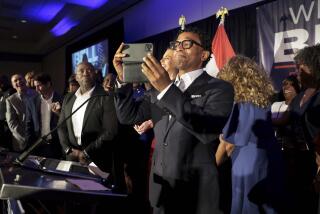Spoken Like a True Missourian, er, Missourahn
- Share via
ST. LOUIS — Matt Blunt, the Republican candidate for governor, tried his very best to pander.
Every time he invoked the name of this great state, he paused first, concentrated, made a deliberate effort to say, “Missour-ee.” After all, an informal survey commissioned at the state fair showed that’s what most folks call the Show Me State.
He kept it up maybe a day and a half.
Then Blunt, who is secretary of state, could maintain the charade no longer.
He’s now proudly back in the minority camp, pronouncing the state’s name “Missour-ah,” just as his family has for six generations.
“He made a good-faith effort,” said Spence Jackson, his spokesman. “But his heart was always with Missour-ah.”
Of all the many issues that divide this electoral swing state, none is less important, but more passionately debated, than what to call the place.
Tradition has it that rural residents favor Missour-ah, so that pronunciation carries with it a down-home, corn-and-hogs-and-farmers connotation. To some, it’s refreshingly authentic. Missour-ee, in contrast, is favored by city dwellers, giving that approach an air of cosmopolitan refinement. Or so its adherents would like to think.
In truth, there’s no clear-cut divide, no way to deduce a person’s education level or hometown or politics by how he or she articulates the state’s name. Still, the stereotype is so strongly held that it might as well be based in fact. Politicians tend to use Missour-ah when they want to sound like a son of the soil and Missour-ee when they’re aiming for a sophisticated image.
“There’s a folk idea that ‘real’ Missourians say Missour-ah -- and in language, perception is what counts,” said Adam Brooks Davis, an English professor at Truman State University in Kirksville.
The debate flared anew last month when the St. Louis Post-Dispatch wrote a piece noting that the Democratic candidates for governor, locked in a close and often nasty fight heading into today’s primary, can’t even agree on what to call the state.
Incumbent Gov. Bob Holden is an unwavering Missour-ee man. His challenger, auditor Claire McCaskill, toggles back and forth, sometimes using both pronunciations in the same sentence. Even in her TV ads, she’s on the fence. The spot showing her in jeans by a grain elevator, talking ethanol, has her saying Missour-ah. The one in which she’s wearing a business suit and promising to cut government waste features her saying Missour-ee.
“The way we look at it, if she says it both ways, she probably has all the bases covered,” said spokesman Glenn Campbell. “It shows she can be governor for the whole state.”
Or, perhaps, that she’s the ultimate flip-flopper, suggested voter Denise Bussen-Murnin, an administrative assistant in suburban Crestwood. “It tells me she’ll say anything to get elected when even on such a minor issue ... she can’t be honest enough to pronounce the state the way she would normally pronounce it,” Bussen-Murnin said.
To be fair, McCaskill probably isn’t aware that she’s flipping back and forth. Linguists even have a term for the phenomenon: accommodation.
“People tend to unconsciously adapt their speech to those around them,” explained Dennis Baron, a professor of English at the University of Illinois, Urbana-Champaign.
That may be why some linguists fear that Missour-ah is on the way out.
In an exhaustive, scholarly work on the subject -- 23 pages, single-spaced -- the late linguist Donald M. Lance concludes that younger people are overwhelmingly adopting the Missour-ee pronunciation, just as they’re choosing Miam-ee over Miam-ah in Florida and Cincinnat-ee over Cincinnat-ah in Ohio.
Except in isolated pockets in the rural northwest, Lance found a “drastic loss” of the Missour-ah pronunciation in the Show Me State over the last half-century. His research, soon to be published posthumously by the Missouri Folklore Society, has led some scholars to conclude that Missour-ah will fade out of the vernacular within a few decades.
Blunt’s informal survey, taken in the summer of 2002, supported the trend: 74% of the 5,300 fairgoers who voted preferred Missour-ee.
Martin Northway intends to do all he can to prevent Missour-ah from fading away altogether.
A regional historian based in the heart of Missour-ah territory, Northway defends his pronunciation with pride -- and urges his neighbors to keep the faith, even in the face of city-slicker scorn.
His home base of Calloway County in north-central Missouri is often called Little Dixie because it was settled in the early 1800s by Southerners. Preserving their way of speech is Northway’s manner of expressing respect for these ancestors (though not their views on slavery).
“It evokes the customs and heritage of the South -- sweet tea, fried chicken, a round of visiting on Sundays,” he said.
Northway isn’t bothered when state officeholders adopt Missour-ah while speaking to rural constituents. On the contrary, he looks at it as a marker of respect for the values and traditions Missour-ahns hold dear.
But let a rural politician start using Missour-ee in deference to urban voters, and Northway will be on his case.
As he puts it: “That’s kind of uppity.”
More to Read
Sign up for Essential California
The most important California stories and recommendations in your inbox every morning.
You may occasionally receive promotional content from the Los Angeles Times.













